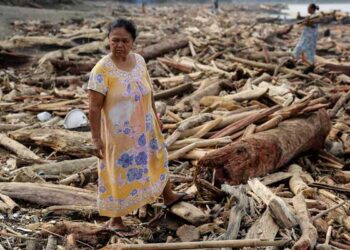Select Language:
On Friday, the United Arab Emirates (UAE) experienced a blistering high of 50.4 degrees Celsius, marking the hottest May temperature ever recorded. This extreme heat follows an ongoing wave of soaring temperatures in a nation particularly at risk from climate change.
Participants of Friday prayers reported feelings of lightheadedness, and some appeared unstable on their feet, even in a country known for its extreme heat.
The peak temperature was registered in an area of Abu Dhabi, the capital of this oil-rich Gulf nation, situated in one of the hottest regions on Earth.
“The heat today was absolutely unbearable,” remarked a 26-year-old resident of Abu Dhabi, who arrived late at the mosque and had to pray outside. “I was soaked in sweat by the time the prayers ended, feeling as if I might faint,” he added, opting to remain anonymous.
The measured high of 50.4°C (122.7°F) is unprecedented for May since record-keeping began in 2003, exceeding the previous record of 50.2°C set in 2009, according to the National Center of Meteorology as reported by AFP.
The UAE, one of the largest oil exporters globally and the host of the COP28 climate talks this year, just wrapped up a record-setting April with an average daily high of 42.6 degrees Celsius.
‘Swaying Right and Left’
The NMC urged residents to take precautions, recommending they stay out of direct sunlight, stay hydrated, wear suitable clothing, and apply sunscreen.
This extreme heat was compounded by humidity levels reaching up to 80% in some parts of Abu Dhabi.
“I actually saw someone swaying back and forth before he had to stop at the side of the road,” said Muhammad Juma, a 31-year-old marketing professional based in Dubai. “Honestly, it’s a scary situation for people,” he emphasized.
Youssef, 45, who operates hot air balloons for tourists in Dubai, stated that the “stifling” conditions left him feeling “completely incapacitated”.
“The main issue is the humidity. The air feels devoid of oxygen,” he added, opting not to share his last name.
Scientists have established that frequent heatwaves serve as a clear indicator of global warming, which is predicted to become more frequent, prolonged, and severe. In the last 30 years, the count of extremely hot days has nearly doubled worldwide.
Outdoor workers in Arab nations endure some of the highest levels of heat stress globally, with a staggering 83.6% facing excessive heat exposure on the job, according to a 2024 report from the International Labour Organization, part of the United Nations.
The dangers of a warming planet were evident last June when more than 1,300 individuals died during the Hajj pilgrimage in neighboring Saudi Arabia, as per official figures, most of whom were unauthorized pilgrims subjected to prolonged outdoor exposure.
According to a 2022 Greenpeace study, the Middle East is at heightened risk for water and food shortages, as well as severe heatwaves, due to climate change. The report highlighted six countries, including the UAE, and indicated that the region is warming nearly twice as fast as the global average, rendering its food and water resources “extremely vulnerable” to climate change.







